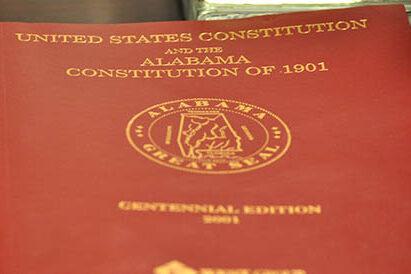Although the so-called emergency actions taken by Gov. Kay Ivey in response to the COVID-19 pandemic in 2020 seem to be fading in the rear-view mirror, they have left behind unanswered legal questions about the constitutionality of those actions.
In the latest issue of The Alabama Lawyer, the bi-monthly magazine of the Alabama State Bar, David G. Wirtes, Jr., Joseph D. Steadman, Aaron N. Maples and Joseph D. Wirtes, all affiliated with the Mobile-based Cunningham Bounds, LLC firm, attempt to answer questions about the constitutionality of Ivey's use of emergency executive power to "abolish causes of action, change the standard of care, and confer immunity."
The authors also take issue with the Alabama Legislature's 2021 COVID-19 Immunity Act, the codifying mechanism of Ivey's actions, which they argued: "raises constitutional questions because it purports to retroactively abolish accrued causes of action, change the standard of care, and confer immunity."
The authors cite Article I § 21 of the Alabama Constitution, stating, "That no power of suspending laws shall be exercised except by the legislature."
"Through her emergency proclamations, Governor Ivey has exercised a broad suspension power pursuant to the AEMA by issuing emergency orders purporting to change substantive tort law. As a result, Governor Ivey's actions are arguably unconstitutional," they wrote.
Article begins on page 310
Throughout the time of her numerous emergency executive actions, Ivey resisted calls for a special session to deal with the outstanding issues left from the abbreviated 2020 regular session and to deal with taxation on federal coronavirus relief, the extension of economic development packages and legal protections for businesses from liabilities of the pandemic, despite calls from some lawmakers to do so.
The authors also claimed Ivey's use of emergency power to amend existing law without the legislature's approval is "afoul of the separation of powers," a claim they backed up by citing state court precedent.
"The Alabama Constitution provides that only the state legislature can exercise the suspension power; moreover, it requires that the executive branch abstain from usurping the lawmaking function reserved to the legislative branch," they wrote in the article's conclusion.
The authors warned these constitutional hurdles could come into play should counsel consider relying on the language of Ivey's emergency orders.
"In Alabama, lawyers contemplating or confronted with immunity defenses premised upon Governor Ivey's emergency proclamations, the AICA, or the AEMA must be aware of Alabama's constitutional limitations upon exercises of power during emergencies," they wrote.
Jeff Poor is the executive editor of 1819 News and host of "The Jeff Poor Show," heard Monday-Friday, 9 a.m.-noon on Mobile's FM Talk 106.5. To connect or comment, email jeff.poor@1819News.com or follow him on Twitter @jeff_poor.
Don't miss out! Subscribe to our newsletter and get our top stories every weekday morning.










